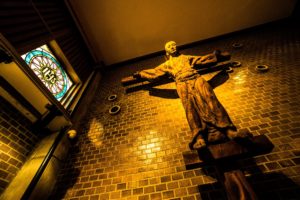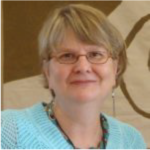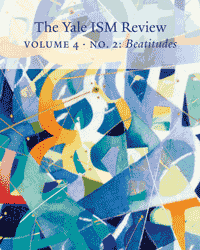Cheryl Cornish
Blessed are those who are persecuted for righteousness’ sake,
for theirs is the kingdom of heaven.
Nishizaka Hill, on the outskirts of Nagasaki, is the site of the Twenty-Six Martyrs Museum and Monument. It was built to commemorate the martyrdom of twenty-six men and three children who were hung with chains and ropes on crosses there and then slaughtered. The year was 1597, the inauguration of an era of great persecution of Christians in Japan. After being imprisoned, they had been forced to march 480 miles from Kyoto in the winter cold. The crosses were lined up and waiting for them on the hill. As legend goes, one of the boys, seeing the crosses, said, “Show me my cross.” The other boy followed with “Show me mine.”[1]

From the Twenty-Six Martyrs Museum and Monument. Photo Source: KOSUBLOG
This cry, “Show me my cross,” represented a defiant acceptance of a righteousness that is not of this world. It was, in the midst of extreme persecution, an extraordinary declaration of Jesus’ teaching: “If any would come after me, let him deny himself and take up his cross and follow me” (Matthew 6:24).
The eighth beatitude, “Blessed are those who are persecuted for the sake of righteousness” amplifies this very point. If it is true that we meet Jesus on a cross rather than a throne, and the cross stands at the very center of our faith, surely it follows that persecution will come even to the most righteous among us, along with the strange promise of blessing.
But what kind of righteousness are we talking about? What kind of blessing is found in persecution?
If it is true that we meet Jesus on a cross rather than a throne, and the cross stands at the very center of our faith, surely it follows that persecution will come even to the most righteous among us, along with the strange promise of blessing.
Being righteous, after all, is quite different from “feeling righteous”—a feeling that can be powerfully attractive. There’s a wonderful energy that comes from feeling that we are on “the right side” of things, a satisfaction in shaking our fists at those sinners out there who “don’t get it,” who are ignorant of the truth we see, and so choose, willfully, to go the wrong way. This “righteous” energy can be so delightful, in fact, that it carries us to places we didn’t intend to go.
I think of a conversation I had with a church member years ago, a gracious and giving woman whom I respected greatly. She grew up in Germany during the rise of the Nazi state before her family emigrated to the United States. She shared, with some confusion and dismay: “I still remember fondly the Nazi rallies of my childhood! They were far more inspiring than anything I ever felt in church! We lit candles as we dedicated ourselves to serving others, to bringing peace, and to the welfare of the world. We sang moving hymns that promoted dedication to a cause beyond our own selfish interests. We were motivated to become strong, disciplined and persevering. As a child, how could I know what I was praising and what the outcome of such rallies would be?”
Indeed, there is something almost addictively attractive about our desire to be “right.” When dressed up as a righteous cause, bigotry and even violence can find easy justification. The conviction that we ourselves are righteous quiets our insecurities and fears, and unites us against perceived enemies. A shared enemy can unite even the most divided congregation as the group rallies righteously against the threat of “them”—whoever “they” might be!
Witness how the fear of Communism in the 1950s united Americans—at great cost to those who lost jobs, and even their homes, because of rumors or their refusal to disavow Communism. So energizing was the sense of righteousness generated by fighting “the Reds” that toward the end of the Cold War, Georgi Arbatov, an advisor to Mikhail Gorbachev, told a group of American journalists: “We are going to do something terrible to you—we are going to take away your enemy.”[2]
The attractiveness of false conceptions of righteousness remains evident today, in our own society. A survey by the Public Religion Research Institute, for example, found that a majority of white evangelicals believe that Christians face discrimination in the United States and feel that Christians are more likely than Muslims to experience religious oppression.[3] “Religious oppression” might be defined in a variety of ways, of course, but one measurement may give a clue. Muslims were the victims of 24% of all religious hate crimes in the country in 2016 while constituting only 1% of the population.[4] Although Christians represent 70% of the U.S. population, only 11% of hate crimes are directed against them.[5] Our national political leadership is 91% Christian-identified.[6] Christians who are accustomed to occupying the cultural center of the country may be surprised when businesses or schools acknowledge the existence of other groups. But use of the term “the holiday season” hardly constitutes a “war on Christmas,” as has sometimes been argued!
Jesus was well aware of our tendency to make righteousness not only a cloak to cover our insecurities but also a sword to attack others. His very life and witness, ending on a cross, invites a different kind of journey into the notion of righteousness—a journey marked by humility, vulnerability, sacrifice, and forgiving love.
The messy nature of righteousness as it is lived and embodied in the choices each of us makes became painfully obvious.
On April 4, 2018, the city of Memphis, Tennessee marked the fiftieth anniversary of the assassination of Rev. Martin Luther King, Jr. The city prepared for thousands of visitors to join them in significant reflection on the legacy of Dr. King. Internationally recognized speakers and civil rights leaders gathered. There were indictments to be made, failures to acknowledge; there was progress to be celebrated and commitments to be renewed.
With a publication date that coincided directly with this historic anniversary, the release of investigative reporter Marc Perrusquia’s A Spy in Canaan caused quite a stir, revealing that a local legend—the photographer Ernest Withers—had a double identity. He was not only a chronicler of the civil rights movement but also an FBI informant. This beloved man, now deceased—and his legacy—were being challenged by this previously unreleased information.
Memphians knew Withers as an affable presence, someone who bravely documented African-American history with his camera and shared that story with the world. Withers created some of the most iconic images of the civil rights era, notably, the famous photo of striking sanitation workers carrying the famous “I AM A MAN” signs. He has a street named after him. The Withers Collection Museum and Gallery on Beale Street is testimony to his work.
A Spy in Canaan opened a painful debate. Should Withers be remembered as a friend of the movement, as his many friends and family argued, or as a man who, as an FBI informant, betrayed not only Dr. King, but many personal friends and civil rights workers? Rev. Andrew Young had described Withers “…as a guy who ran significant risk to photograph and record our history. He always showed up. And that was important to us. Because that helped us get our story out.”[7]
Others could not ignore the painful consequences of his actions. “This man has ruined my life,” said Kathy Roop Hunninen, speaking of the depression she suffered after she lost her position with the federal government in 1986, when reports surfaced of FBI surveillance of her as a suspected Communist in the late 1960’s.[8]
Asked about the revelation, civil rights activist Rev. James Lawson refused to judge Withers, even though he himself had been subject to his betrayal. Dozens of tips about Lawson’s civil rights work and activities in Memphis had been turned over by Withers to the FBI through the years. Even so, Rev. Lawson named Withers not as a traitor to the cause, but as a father who had eight children to support; as someone who may not have fully understood the damage he might do; and as a man who trusted the FBI to use the information responsibly. “In the age in which we lived,” Lawson said, “we were not as aware.”[9]
It became impossible to neatly categorize Withers either as saint or sinner. Few people, including Marc Perrusquia himself, were eager to minimize either the good done by Withers or the pain he caused. The messy nature of righteousness as it is lived and embodied in the choices each of us makes became painfully obvious. Dr. Lawson’s words of forgiveness became an anchoring component of the dialogue, lifting us beyond neat categories of judgment and onto the cross itself.
Coretta Scott King wrote that “Martin’s repeated, unwarranted arrests . . . pushed me to the breaking point.” How did they survive at that breaking point and persist under the weight of such persecution? Dr. King spoke of learning to experience “unearned suffering as redemptive.” He likewise spoke of accepting persecution as “an opportunity to transform (himself) and heal the people involved in the tragic situation which now obtains.”[10]
King named forgiveness as a process of life, an attitude. He called it “the Christian weapon of social redemption” and “the solution of the race problem.” “We are to go out with the spirit of forgiveness, heal the hurts, right the wrongs and change society with forgiveness.”[11]
It is our need for forgiveness and our need to forgive that transforms righteousness from a self-justifying framework to a source of life. This understanding moves the ground of Christian righteousness from self-justification to the cross itself. Forgiveness is at the heart of Jesus’s proclamation on the cross: “Father, forgive them, for they know not what they do.” With those words, the righteousness of Jesus’s persecutors is called into question. They are the religious and political authorities, yet they do not understand. Filled with confidence in their own righteous judgment, they are condemning not just an innocent man, but the very embodiment of God’s grace in the world. Through forgiveness, the shallow ground of human understandings and applications of righteousness become a place of divine intervention and encounter.
“God is Love,” we proclaim. And the very understanding of God as a Trinitarian presence, as “three-in-one,” makes God a self-emptying presence. God is an “other” even unto Him/Herself in this dynamic interaction of Creating, Redeeming, and Sustaining presence and identity. Being created in the image of God, we find our deepest self-awareness in self-emptying love—in gestures of sacrifice and grace empowered from an encounter with a Loving Other, a source beyond our own brittle definitions of “right” and “wrong.”
It is our need for forgiveness and our need to forgive that transforms righteousness from a self-justifying framework to a source of life.
We are blessed when the presence of the cross enters our worship. I think of a moment when a developmentally challenged man had been asked to sing “Precious Lord” in worship. He had a beautiful voice and was well-rehearsed. Imagine my surprise when he rose to sing, and rather than facing the congregation, he moved in front of the communion table and faced the cross, kneeling! He sang with passion and devotion. When I asked him about it after the service, he said, “Jesus has always been my friend when I am in trouble or afraid. When I sing, I sing to him!” The power of a man, weak by the world’s standards, understanding the strength of the cross so profoundly—singing, “Precious Lord, take my hand”—could hardly be lost on the congregation.
As a Christian, I seek to engage in righteous work, that is, the work of “looking after orphans and widows in their distress” (James 1:27), feeding the hungry, uplifting the broken-hearted, speaking out for the oppressed. I denounce policies and behaviors that bring misery to God’s people. I speak up for the rights of the poor to food, shelter, health care, and decent wages. When I am criticized for this advocacy, I turn to the eighth beatitude, “Blessed are those who are persecuted . . .”, knowing, even as I do it, that what I am experiencing could hardly be called persecution.
But Jesus’s words stand as a poignant reminder, and an invitation, to leave defensive, self-justifying ground so that I might be lifted more fully into the embrace of a grace-filled God. The power of forgiveness—as I have received it and offered it—becomes most real to me in these moments.
I remember the boy’s question from Nishizaka Hill and ask myself: “Where is my cross?” On the cross, I see a calling to love with both forgiveness and vulnerability. On the cross, I see a righteousness that enables the new beginnings and the social transformation that Dr. King envisioned. On the cross, I see a place where the love of God can live through me in ways that extend beyond my own self-justification and ego.
And then, I can begin to see the invitation implicit in Jesus’s words: “Blessed are those who are persecuted for the sake of righteousness . . . theirs is the kingdom of heaven.”
 Rev. Cheryl Cornish has been pastor of First Congregational Church in Memphis since 1988. Named as one of the 36 “Most Vital” congregations in the denomination, First Congregational has engaged in creative witness and partnership with the thirty other organizations housed within its facilities. Ministries of the church include the Revolutions Bicycle Co-op, the Global Goods Fair Trade Store, the Pilgrim House Hostel and “Voices of the South”, a regional theater. In 2003, Cheryl received Women of Achievement’s “Courage” award for her activism. She received the “Award for Distinction in Congregational Ministry” from Yale Divinity School in 2008. She is married to flamenco guitarist Mark Allen.
Rev. Cheryl Cornish has been pastor of First Congregational Church in Memphis since 1988. Named as one of the 36 “Most Vital” congregations in the denomination, First Congregational has engaged in creative witness and partnership with the thirty other organizations housed within its facilities. Ministries of the church include the Revolutions Bicycle Co-op, the Global Goods Fair Trade Store, the Pilgrim House Hostel and “Voices of the South”, a regional theater. In 2003, Cheryl received Women of Achievement’s “Courage” award for her activism. She received the “Award for Distinction in Congregational Ministry” from Yale Divinity School in 2008. She is married to flamenco guitarist Mark Allen.
[1]Story shared by Makoto Fujimura, Silence and Beauty (Downers Grove, Illinois: IVP Books, 2016), 45-46
[2]Jim Forest, The Ladder of the Beatitudes (Maryknoll, NY: Orbis Books, 1999), 139
[3] Emma Green, “White Evangelicals Believe They Face More Discrimination than Muslims”, The Atlantic, March 10, 2017 (based on a survey by the Public Religion Research Institute in February, 2017)
[4]Lopez, German, “A new FBI report says hate crimes—especially against Muslims—went up in 2016” Vox.com, http://www.vox.com/identities/2017/11/13/16643448/fbi-hate-crimes-2016 (accessed July 29, 2018).
[5] Flesher, Paul, UW Religion Today: The Surprises About Anti-Religious Crime in America”, http://www.uwyo.edu/uw/news/2018/02/uw-religion-today-the-surprises-about-anti-religious-crime-in-america.html (accessed September 14, 2018)
[6]Emma Green, “White Evangelicals Believe They Face More Discrimination than Muslims”, The Atlantic, March 10, 2017
[7]Marc Perrusquia, A Spy in Canaan, (Brooklyn, NY: Melville House, 2017, xvii
[8]Ibid., xvi
[9]Ibid, x-xi
[10] Michael K. Honey, To the Promised Land: Martin Luther King and the Fight for Economic Justice (New York: W. W. Norton and Company, 2018), 48.
[11] Martin Luther King, sermon outline, “The Meaning of Forgiveness”, The Papers of Martin Luther King, Jr., Volume VI; Advocate of the Social Gospel, September, 1958-March, 1963, Clayborne Carson, Susan Carson, Susan Englander, Troy Jackson and Gerald L. Smith, eds., University of California Press at Berkeley and Los Angeles, 2007, 580, 581.
